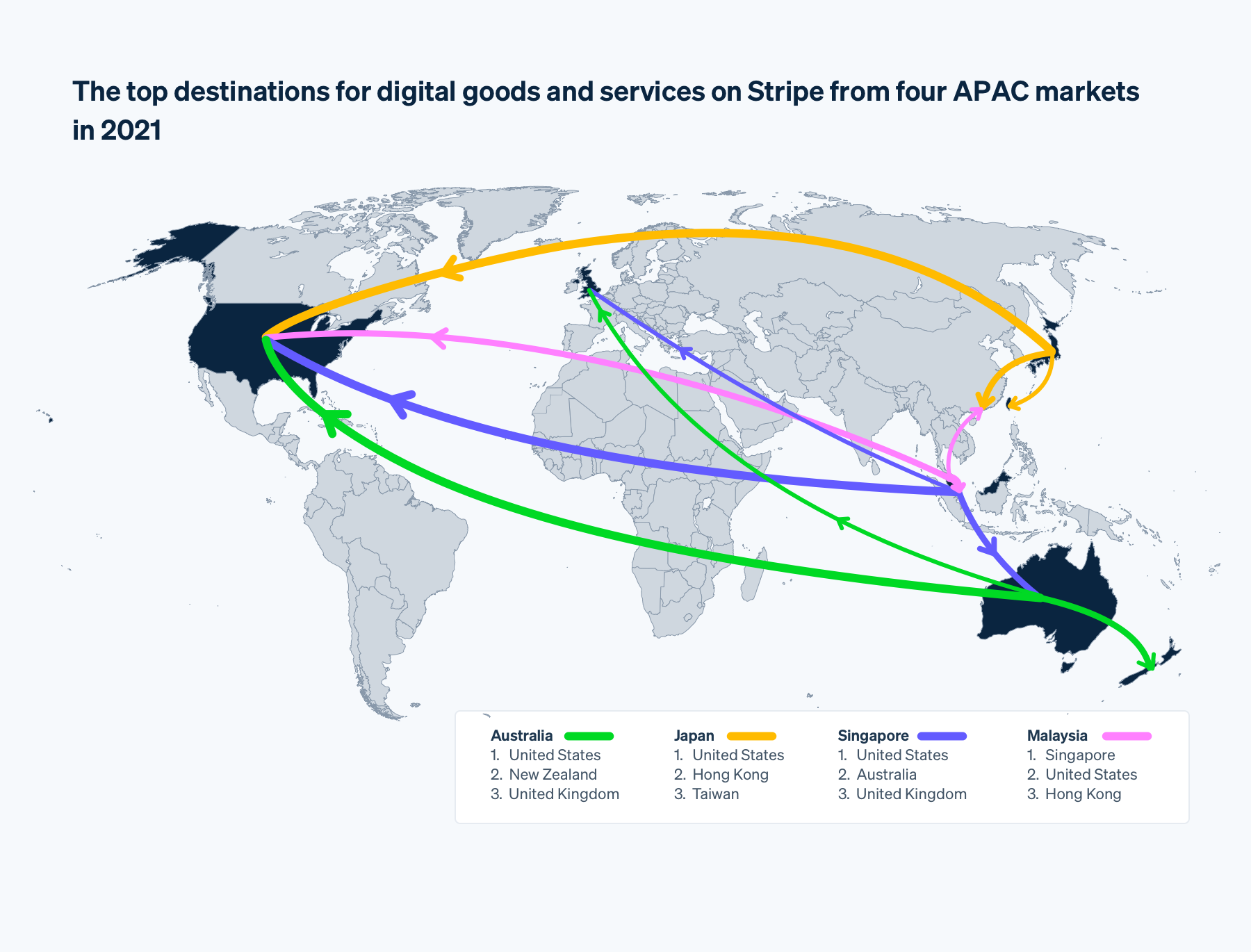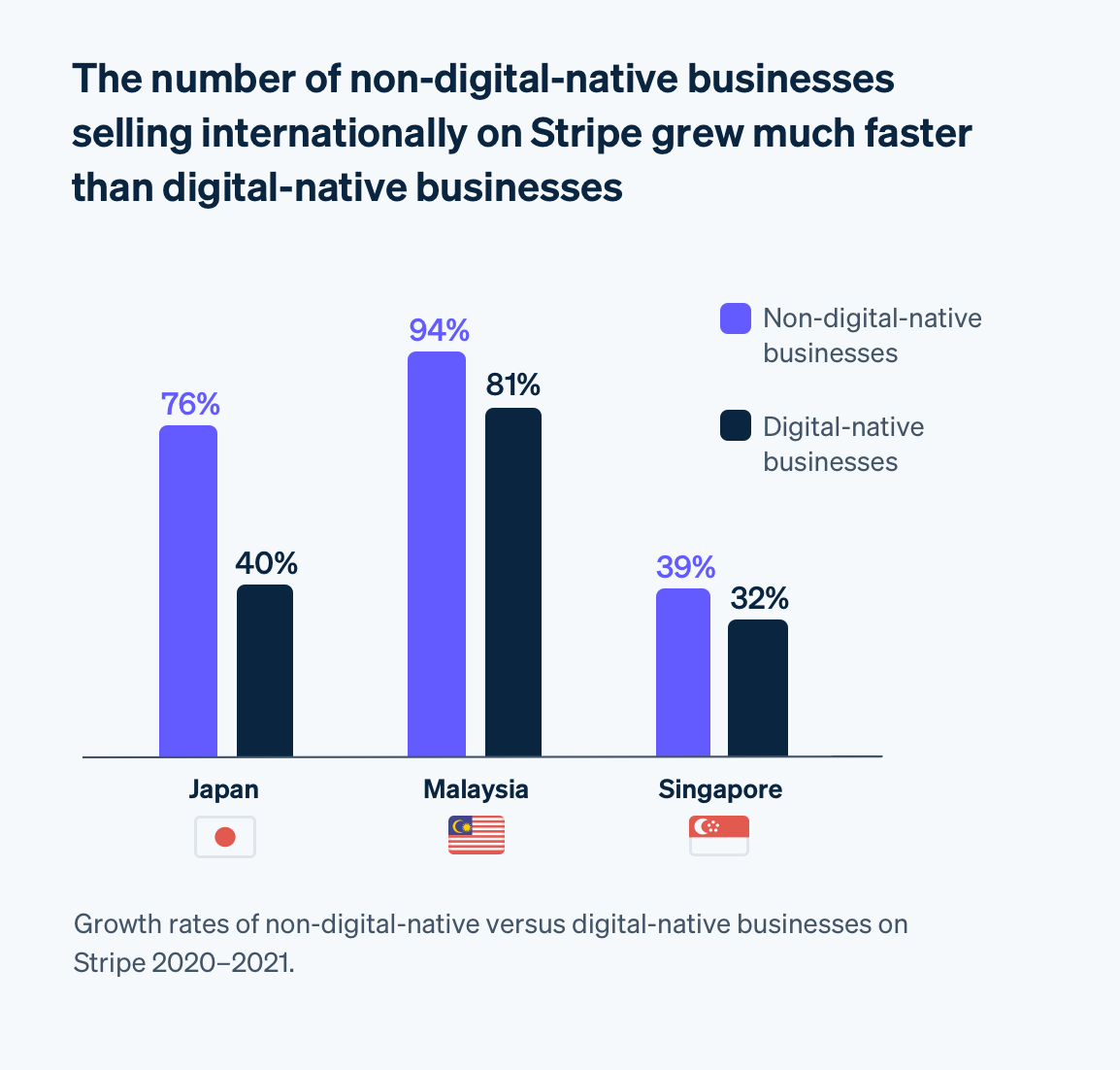
(Source – Shutterstock)
Digital exports are spurring a shift in global growth opportunities
- The United Kingdom was the fastest-growing market for Malaysian businesses selling digital exports on Stripe, with 280% growth in businesses selling to the country between 2020 and 2021
- Australia emerged as the fastest-growing market for Singaporean businesses, with a 200% growth in online sales on Stripe in 2020-2021
Digital exports have become increasingly influential for businesses in their expansion plans, particularly following the effects of the COVID-19 pandemic. Today, more businesses are shifting their focus to how they can improve their digital imports given the growth opportunities it promises, despite the challenges of the global economy.
As digital exports simply mean the ability for an organization to expand and grow their businesses internationally through online channels, having the right infrastructure and ecosystem to support it is key.
In fact, a report by Stripe showed that the number of non-digital businesses selling internationally grew much faster compared to digital native businesses. And this is made possible through having a complete ecosystem, especially in terms of payments.
The findings of the report by Stripe are based on three years of proprietary data that reveals the emergence of new digital export flows from four Asia-Pacific countries that include Malaysia, Australia, Japan, and Singapore.
By analyzing the sales of businesses on Stripe across the four countries, the report indicates the emergence of new digital export routes that are determined by global demand and market fit rather than traditional supply chain routes. The report also shows how digital platforms are transforming the economics of doing business across borders while creating new growth opportunities for all kinds of businesses.

(Source – Stripe)
According to the report, when it comes to digital exports in Malaysia, Singapore has emerged as the biggest growth opportunity for businesses in Malaysia selling on Stripe in 2021, followed by the United States and Hong Kong. The United Kingdom is the fastest-growing market for Malaysian businesses selling on Stripe, with a 280% growth in businesses selling to the country between 2020 and 2021.
Interestingly, both digital-native and non-digital native is now aiming for global sales as the barriers have been reduced for them to reach out to new international audiences and buyers, with SMBs and non-digital native businesses growing their sales by 94% between 2020 and 2021. The top five industries that sold internationally online on Stripe in Malaysia last year were merchandise, clothing & accessories, grocery stores, personal services and business services.
One such business is Flower Chimp. The floral company was able to seize cross-border opportunities, enabling Southeast Asian florists to serve customers across the region. By using Stripe’s payments infrastructure, Flower Chimp has built a simple, secure checkout experience for its customers — wherever they are ordering from. Since working with Stripe, Flower Chimp’s conversion rate has increased from 2.5% to 8%, including a 37% boost to its mobile checkout conversion rate.
For Sarita Singh, Stripe’s Revenue Growth Lead, Southeast Asia, international trade has played a critical role in the development of Malaysia’s economy. She added that for many local businesses, particularly the micro, small and medium enterprises (MSMEs), technology has been the great equalizer and has opened the floodgates to opportunities beyond Malaysian borders.
“Even as the macroeconomic uncertainty grows, the trend of digital exports provides an opportunity for businesses of all sizes to find new customers in less impacted regions. Working with financial infrastructure platforms such as Stripe enables businesses in Malaysia to be more efficient, adaptable, and scalable in their global expansion in a wide range of countries, currencies, and local payment methods,” commented Singh.

(Source – Stripe)
Increased growth in Singaporean digital exports
Meanwhile, in Singapore, the number of non-digital-native businesses selling internationally on Stripe grew a little faster (39%) than the number of digital-native businesses (32%) between 2020 and 2021. The pandemic played a role in pushing these more traditional businesses online. With the effects of an economic slowdown starting to be felt, those same businesses are now looking to take their technology investments further. By properly integrating their online and offline channels, they hope to boost customer satisfaction and loyalty as a hedge against price sensitivity.
The report also showed that Australia emerged as the fastest-growing market for Singaporean businesses, with 200% growth in online sales on Stripe between 2020 and 2021. Both countries are signatories to the Regional Comprehensive Economic Partnership (RCEP), a free-trade agreement between the 10 member states of ASEAN, which means this relationship should continue to flourish.
Given Singapore’s small domestic market, Singaporean businesses have long recognized the importance of exporting globally. Non-digital-native businesses are joining Stripe to sell internationally at a faster rate than their digital peers, with 39% growth on Stripe between 2020 and 2021 compared to 32% for digital-native businesses.
READ MORE
- The criticality of endpoint management in cybersecurity and operations
- Ethical AI: The renewed importance of safeguarding data and customer privacy in Generative AI applications
- How Japan balances AI-driven opportunities with cybersecurity needs
- Deploying SASE: Benchmarking your approach
- Insurance everywhere all at once: the digital transformation of the APAC insurance industry


